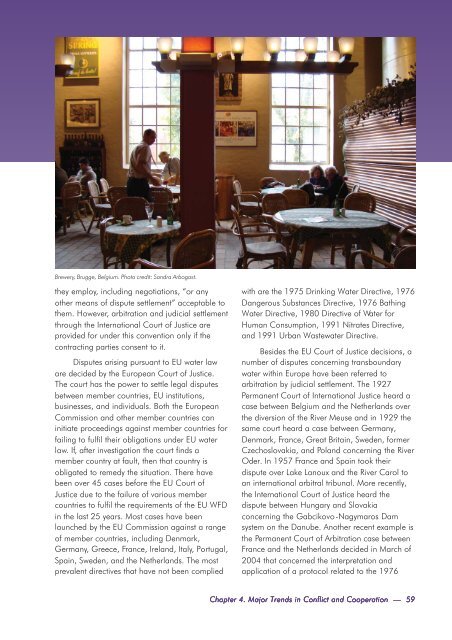Europe - UNEP
Europe - UNEP
Europe - UNEP
Create successful ePaper yourself
Turn your PDF publications into a flip-book with our unique Google optimized e-Paper software.
Brewery, Brugge, Belgium. Photo credit: Sandra Arbogast.<br />
they employ, including negotiations, “or any<br />
other means of dispute settlement” acceptable to<br />
them. However, arbitration and judicial settlement<br />
through the International Court of Justice are<br />
provided for under this convention only if the<br />
contracting parties consent to it.<br />
Disputes arising pursuant to EU water law<br />
are decided by the <strong>Europe</strong>an Court of Justice.<br />
The court has the power to settle legal disputes<br />
between member countries, EU institutions,<br />
businesses, and individuals. Both the <strong>Europe</strong>an<br />
Commission and other member countries can<br />
initiate proceedings against member countries for<br />
failing to fulfil their obligations under EU water<br />
law. If, after investigation the court finds a<br />
member country at fault, then that country is<br />
obligated to remedy the situation. There have<br />
been over 45 cases before the EU Court of<br />
Justice due to the failure of various member<br />
countries to fulfil the requirements of the EU WFD<br />
in the last 25 years. Most cases have been<br />
launched by the EU Commission against a range<br />
of member countries, including Denmark,<br />
Germany, Greece, France, Ireland, Italy, Portugal,<br />
Spain, Sweden, and the Netherlands. The most<br />
prevalent directives that have not been complied<br />
with are the 1975 Drinking Water Directive, 1976<br />
Dangerous Substances Directive, 1976 Bathing<br />
Water Directive, 1980 Directive of Water for<br />
Human Consumption, 1991 Nitrates Directive,<br />
and 1991 Urban Wastewater Directive.<br />
Besides the EU Court of Justice decisions, a<br />
number of disputes concerning transboundary<br />
water within <strong>Europe</strong> have been referred to<br />
arbitration by judicial settlement. The 1927<br />
Permanent Court of International Justice heard a<br />
case between Belgium and the Netherlands over<br />
the diversion of the River Meuse and in 1929 the<br />
same court heard a case between Germany,<br />
Denmark, France, Great Britain, Sweden, former<br />
Czechoslovakia, and Poland concerning the River<br />
Oder. In 1957 France and Spain took their<br />
dispute over Lake Lanoux and the River Carol to<br />
an international arbitral tribunal. More recently,<br />
the International Court of Justice heard the<br />
dispute between Hungary and Slovakia<br />
concerning the Gabcikovo-Nagymaros Dam<br />
system on the Danube. Another recent example is<br />
the Permanent Court of Arbitration case between<br />
France and the Netherlands decided in March of<br />
2004 that concerned the interpretation and<br />
application of a protocol related to the 1976<br />
Chapter 4. Major Trends in Conflict and Cooperation — 59
















